|
|
|
Sort Order |
|
|
|
Items / Page
|
|
|
|
|
|
|
| Srl | Item |
| 1 |
ID:
159486


|
|
|
| 2 |
ID:
159481


|
|
|
|
|
| Summary/Abstract |
We provide new theory and evidence of the role of domestic women’s coalitions in the adoption of gender quotas. Previous research has shown the importance of women’s movements to policy change. We show that specific types of mobilization, often multiethnic in character, are a more precise way of describing these influences. Using a new dataset of coalitions in 50 countries in Africa (1989–2014), we first examine where coalitions are likely to emerge. Controlling for factors that correlate with their formation, we find that when domestic women’s organizations form a coalition for quotas, governments are more likely to adopt them and do so more quickly. This correlation holds when controlling for international aid, involvement of international women’s movements, and whether countries recently emerged out of major armed conflict, complementing recent scholarship that highlights global influences. A comparative case study of the adoption of a gender quota in Senegal and non-adoption in Benin helps illustrate the nuances of the theory.
|
|
|
|
|
|
|
|
|
|
|
|
|
|
|
|
| 3 |
ID:
159484
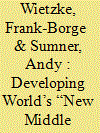

|
|
|
|
|
| Summary/Abstract |
Rapid middle-income growth over the past decades has led to increasing public interest in the developing world’s “new middle classes”. However, these transformations have received less attention in the comparative democratization and welfare-state regime literature. In this review article, we aim to fill this gap by identifying emerging evidence and new directions for research about the social and political consequences of lower-middle income growth. We note that, while socio-cultural and political transformations traditionally associated with expanding middle classes are unlikely to materialize at current levels of socio-economic wellbeing in most developing countries, new pressures for reform may arise out of demands to better protect modest increases in private assets and from improved educational outcomes among lower-middle income groups. We also identify signs of increased distributional conflicts between economically vulnerable lower-middle income groups and more-affluent middle classes that may undermine the transition to stable democracy and more inclusive social policy systems.
|
|
|
|
|
|
|
|
|
|
|
|
|
|
|
|
| 4 |
ID:
159478


|
|
|
|
|
| Summary/Abstract |
There have been many retrospective analyses written about the marriage-equality movement since the Supreme Court’s 2015 ruling that made marriages between people of the same sex legal in all 50 states. Most attribute that triumph to a stunningly swift turnaround in public comfort with and approval of same-sex relationships. However, public opinion data indicates that this narrative is inaccurate. In 2015, 51% of General Social Survey respondents declared that they found sexual relationships between people of the same sex to be “wrong” at least “some of the time.” Nevertheless, at the same time, 56% of respondents affirmed that people of the same sex ought to have the legal right to marry. This dissonance suggests that the most common narrative about the success of the movement misses something crucial about how political persuasion happened in this case, as well as the way that political persuasion happens in general. In this article, I show that the massive shift in support for same-sex marriage was likely not the result of large majorities changing their underlying attitudes regarding gay sexual relationships, but was instead the result of activists inserting new criteria for evaluating same-sex marriage into popular political discourse by consistently using resonant arguments. These arguments reframed the political stakes, changed the public meaning of the marriage debate, and altered the decisional context in which people determine their policy preferences.
|
|
|
|
|
|
|
|
|
|
|
|
|
|
|
|
| 5 |
ID:
159477
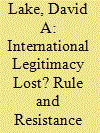

|
|
|
|
|
| Summary/Abstract |
The pillars of the Pax Americana are decaying. There are two critical challenges. Our interests with our closest allies have been drifting apart for decades, with increasingly serious consequences. A new populist and economic nationalist coalition has been mobilized in the United States, challenging the internationalist coalition that has prevailed at home since the second World War. These challenges are not the product of President Donald J. Trump. He is the manifestation of these challenges, not their cause. Understanding these challenges requires examining anew the role of international legitimacy and authority in world politics and recognizing that different international orders have different distributional consequences. This essay summarizes my past research on the incentives for international hierarchy, integrates the role of domestic interests into that theory, and explores the nature and role of international legitimacy in the study of world order. Part II examines the Pax Americana, and contrasts this order with those found in the Caribbean basin and Middle East. The final section outlines the changing incentives for cooperation between the United States and Europe, discusses the rise of populism in the United States, and suggests ways of addressing the current challenges to internationalism.
|
|
|
|
|
|
|
|
|
|
|
|
|
|
|
|
| 6 |
ID:
159480


|
|
|
|
|
| Summary/Abstract |
Against the legal recognition of same-sex marriage, many advocates of religious liberty argue that those who adhere to “traditional” understandings of marriage should not be forced to “recognize” same-sex marriages. This includes exempting individual business owners engaged in commercial activity from anti-discrimination laws. I argue that such exemptions overreach. Equal access to the commercial arena is an essential feature of life in America’s commercial republic, which means that public accommodations should not be given exemptions on religious grounds. Yet this does not require business owners to morally approve of same-sex marriage; nor does it require them to grant same-sex marriages “equal concern and respect.” Rather, it requires simple toleration, which is compatible with moral disapproval. Indeed, I argue that this is the very sort of toleration at the foundation of religious liberty in America. Efforts to grant religious exemptions to anti-discrimination laws invite the return of religious conflict and discrimination. Prohibiting discrimination on the basis of sexual orientation in public accommodations is necessary not only for equal citizenship, but to maintain the regime of toleration that undergirds religious liberty in a pluralistic democracy.
|
|
|
|
|
|
|
|
|
|
|
|
|
|
|
|
| 7 |
ID:
159485
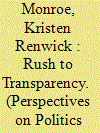

|
|
|
|
|
| Summary/Abstract |
What is the impact of the recent Data Access and Research Transparency (DA-RT) initiative and the Journal Editors Transparency Statement (JETS) on scholars working with qualitative data? Analysis finds DA-RT insufficiently sensitive to the needs of qualitative data and focuses on four inter-related reasons why DA-RT needs to be revised before being widely adopted by political science journals: (1) space constraints that hinder full journal presentation of the analysis of qualitative data; (2) ethical concerns about protecting human subjects, and the time needed to prepare such data before publicly sharing them; (3) costs of data collection and the right of first usage; and (4) a potentially chilling effect of DA-RT on certain types of research topics. Analysis of the author’s own journey from econometric and survey analysis to narrative interviews with people in vulnerable situations, facing moral dilemmas, illustrates why DA-RT needs additional safeguards for qualitative data and methods. Given the increasing importance of qualitative data, and its ability to lend insight into critical political topics, the author argues that implementing the current version of the DA-RT initiative could hinder political science’s ability to address important political questions. Thus DA-RT must be modified to address the special needs of qualitative data.
|
|
|
|
|
|
|
|
|
|
|
|
|
|
|
|
| 8 |
ID:
159479
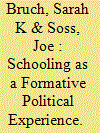

|
|
|
|
|
| Summary/Abstract |
How does formal education matter for inequalities of political behavior across the citizenry? Most answers to this question focus on the things that schools allocate, such as skills, knowledge, and resources. By contrast, we draw on policy feedback research to resuscitate a more “Deweyian” appreciation for schools as sites where citizens have their earliest formative experiences with public authority and learn what it means to participate in a rule-governed community. Using nationally representative panel data, we conduct an intersectional analysis of how race, class, and gender combine to shape student experiences with school authority relations, and estimate how these experiences are associated with later citizen dispositions in young adulthood. We find strong evidence that negative school authority experiences depress young adult political engagement and trust in government. American schools, we conclude, function as powerful sites of experiential learning that tighten the bond between social hierarchies and civic inequalities.
|
|
|
|
|
|
|
|
|
|
|
|
|
|
|
|
| 9 |
ID:
159483


|
|
|
|
|
| Summary/Abstract |
Why do bad policy ideas persist over time? We trace the development of the euro’s governing ideas over fiscal and monetary policy in the face of mounting evidence that continued adherence to those ideas was economically deleterious. We argue that a specific form of social learning, framed by a retrospective recoding in 2010–2012 of Europe’s experience with fiscal rules in 2003–2005, drove European elites to pursue policies that were economically irrational but politically rational. As a result, the Eurozone’s medium-term resilience has been made possible by the European Central Bank’s unconventional and loose monetary policies, which operate in direct opposition to the tight fiscal policies of its member states’ governments. We maintain that this self-defeating macroeconomic policy mix will continue as long as the lessons learned by policymakers are driven by the need to win what we term an authority contest, rather than provide better macroeconomic outcomes.
|
|
|
|
|
|
|
|
|
|
|
|
|
|
|
|
| 10 |
ID:
159482
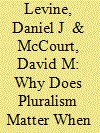

|
|
|
|
|
| Summary/Abstract |
Pluralism has become a buzzword in International Relations. It has emerged in a number of linked literatures and has drawn the support of an unusual coalition of scholars: advocates of greater methodological diversity; those who feel that IR has degenerated into a clash of paradigmatic “-isms”; those who favor a closer relationship between academics and policy-makers; and those who wish to see greater reflexivity within the field. Perhaps unsurprisingly, no single vision of pluralism unites these scholars; they appear to be using the term in divergent ways. Accordingly, our aim is threefold. First, we wish to highlight this odd state of affairs, by placing it in disciplinary and intellectual context. Second, we distinguish between plurality—the de facto recognition that IR has become a more diverse field—and pluralism—a normative position which values that diversity, given the public vocation of social science. Finally, we lay out a more consistent understanding and defense of pluralism in those latter terms. We argue that, properly understood, pluralism entails a position of epistemological skepticism: the straightforward claim that no single knowledge system, discipline, theory, or method can claim singular access to truth.
|
|
|
|
|
|
|
|
|
|
|
|
|
|
|
|
|
|
|
|
|